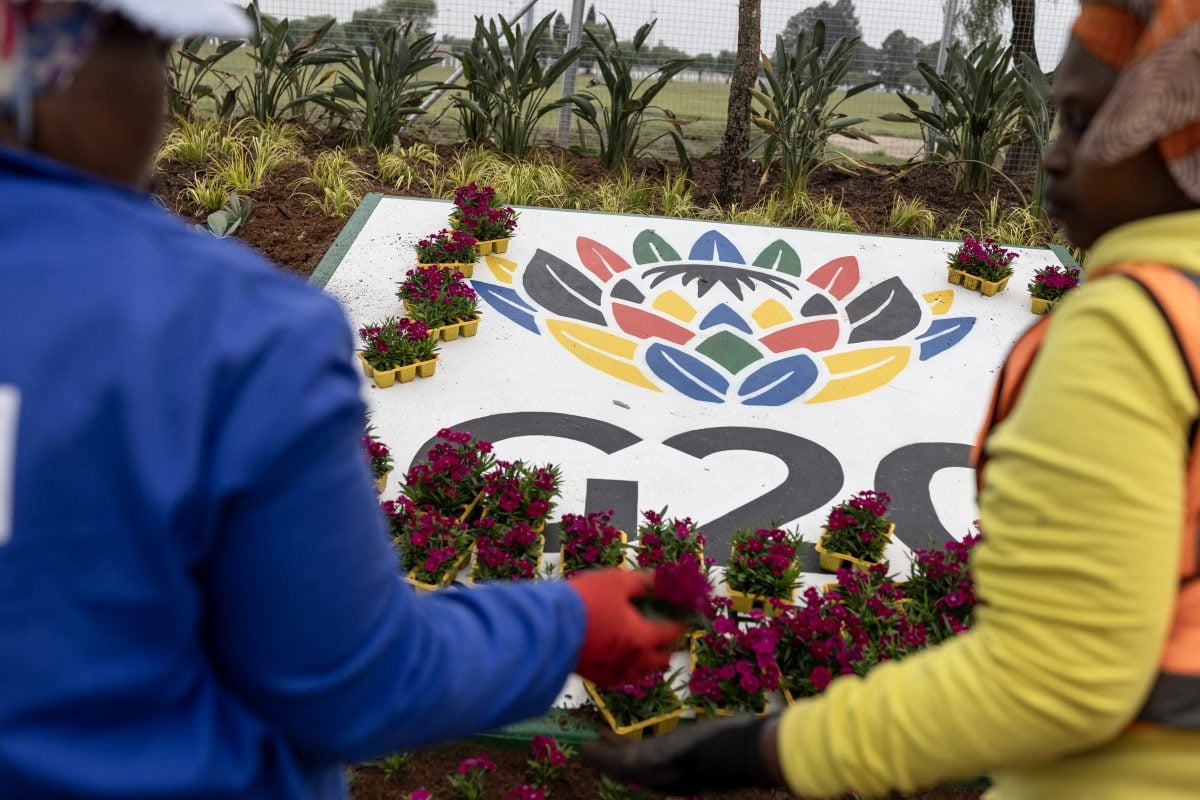For South Africa’s largest businesses, the last few years have been one battle after another. From enduring electricity and water crises to Covid-19 lockdowns and global trade tensions, the country’s business giants have struggled to exude their normal confidence. But for Busisiwe Mavuso, chief executive officer of Business Leadership South Africa, which represents the country’s largest corporations, there is a feeling that the country is finally turning a corner – just in time to offer a compelling narrative as host nation of the G20 and its business counterpart, the B20.
“When we started with the [G20] presidency we were very clear that we’d like to use this as an opportunity to highlight that South Africa is a country on the mend – to highlight the great work that has been done from a structural reform perspective, to send a message which says South Africa is a market that has a lot to offer and is still the gateway to the African continent,” Mavuso says.
‘Business dared to intervene’
South African business has seized the opportunity to lead the agenda: CEOs of some of the biggest companies headed eight B20 taskforces, which offered 30 recommendations to the G20 on kickstarting economic growth. Mavuso herself serves as B20 advisory council chair.
“We wanted to offer that very clear narrative in terms of who South Africa is and the work that is being done to improve the trading environment in this country because we are not naive to the fact that it has not been a conducive trading environment for some time,” she says.
Business lobbying and intervention has, Mavuso says, been crucial in persuading government to finally prioritise fixing the country’s woeful electricity supply problems. She points to the “amazing” progress in power supply; power cuts were the norm in 2023, happening on a majority of days; but just 26 hours of load-shedding were recorded between 1 April and 28 August 2025, across a handful of days. The country has experienced none since, according to power utility Eskom. Some of that is undoubtedly due to businesses and households seeking supply from independent power producers, but Mavuso says the government has also played its part.
“Government has seen the progress the country has made and how much we’ve turned the corner precisely because business dared to intervene. They see the importance of the reform agenda. We’ve been screaming and shouting it for quite some time.”
Saving Johannesburg
Having done a “decent job of showing politicians the importance of this business-government partnership,” Mavuso now wants to apply that momentum to one of the country’s biggest challenges: fixing Johannesburg. Basic infrastructure and services are crumbling in South Africa’s economic capital, which has been badly led by 11 mayors in ten years. Poverty is worsening throughout the city and citizens say its decline is precipitate. William Gumede, associate professor at Wits University’s School of Governance, recently said that the city is on the verge of “becoming a failed city, almost like a failed state”.
Speaking from Business Leadership’s offices in Sandton, in the city’s still-affluent north, Mavuso says urgent intervention is needed from government and business to turn the city around. “We’re now having conversations with the [South African] presidency as Business Leadership about how we can help to fix Johannesburg. Johannesburg is the economic heart of this country.
“When you look at Johannesburg and Cape Town you’ll swear you’re in two different countries. The infrastructure challenges; the maintenance that is just not being done; potholes on the roads; robots [traffic lights] not working; the water security challenges we’re facing; the filth and so forth – the business community has been brought in to try and assist.”
Easing public-private partnerships
As part of the intervention, Mavuso is urging the government to amend legislation to make it easier to fund improvements. Earlier this year, the government amended the restrictive National Treasury Regulation 16, unchanged for 15 years, to make it easier for businesses and government to embark on public-private partnerships (PPPs). But Mavuso says business is “adamant” that they must go further in reforming the rules if PPPs are to take root.
“We are very aware, as business, that the exogenous factors happening outside of South Africa, are something we can do very little about – what we can do is fix our own environment.” That external environment remains tough. The Trump administration has imposed tariffs of 30% on South Africa, and the lapsing of the US’s African Growth and Opportunity Act (AGOA) in October is expected to be particularly damaging for textile, automotive and agricultural exporters who benefited from tariff-free access to the US market under the scheme.
“The tariffs that have been imposed on South Africa of 30% – they reduce our competitiveness as a country. I’m sure motor companies like Mercedes Benz and BMW that chose to set up in South Africa benefited a lot from those cars being manufactured here and are feeling the impact, because that industry was part of AGOA. If they now have to pay a 30% import tariff when they export from South Africa [to the US], we worry about whether they would not rather shut down factories here and go elsewhere where tariffs are 10%.”
Mavuso says the tariffs could worsen the country’s employment crisis. Official unemployment was 33.2% in the second quarter of 2025, with a startling youth unemployment rate of 46.1%. “We worry about the agricultural exports that are going to the US and what that would mean for the industry in South Africa. When you look at the South African labour market it is still characterised by unskilled and skilled labourers; industries like manufacturing, the auto industry, as well as agriculture, have a high propensity for absorbing those. It makes a bad problem worse.”
The continent on the doorstep
While the polycrisis has been hugely damaging, South African’s major companies have proved resilient and adaptable – not least by increasing their exposure to faster-growing economies in Africa and seeking to benefit from the rollout of the African Continental Free Trade Area (AfCFTA). Engagement with the rest of the continent is a key goal of the B20 and G20 process, Mavuso says.
African engagement “was our ‘true north’ going into the B20. We were very deliberate about trying to get as much as possible from the broader African participation in the different workstreams, and we did have great participation of African businesses,” Mavuso says.
That willingness to engage more with other African markets extends to advocating for their shared interests through the B20 and G20 forums. “It’s been encouraging to see how a lot of the B20 recommendations have finally come out, and quite a few are actually Africa and Global South focused. One, from the trade and investment task force, talks about accelerating African integration and seeks to look at how the global community supports full and fast implementation of the AfCFTA. There’s a lot of excitement in terms of getting that going. It’s a $3.4 trillion market.
“I think that speaks to the strategic importance of the African continent going forward. The work that has been done by the B20 taskforces is going to give us a very good foundation from which to start positioning ourselves as a market of the future.”

 Sign in with Google
Sign in with Google 



